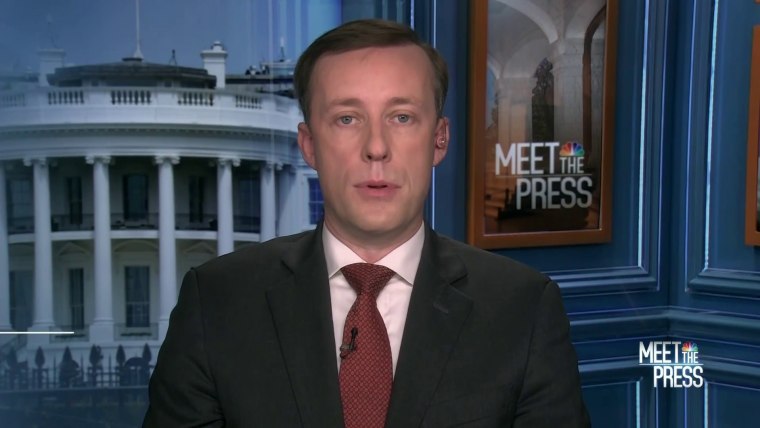National Security adviser Jake Sullivan on Sunday defended the Biden administration’s decision to send cluster munitions to Ukraine in a U.S. military aid package amid pushback from some congressional Democrats.
“Our moral authority has not derived from being a signatory to the Convention Against Cluster Munitions. We are not, we have not been, at any point since that convention came into effect, neither has Ukraine,” Sullivan said in an interview on NBC News’ “Meet the Press.”
Most members of NATO have signed on to the Convention on Cluster Munitions, an international agreement that bans the use, production, transfer and stockpiling of the weapons because of the risk they pose to civilians. But the U.S. has not signed the treaty, and neither has Russia or Ukraine.
“Our moral authority and Ukraine’s moral authority in this conflict comes from the fact that we are supporting a country under a brutal, vicious attack by its neighbor with missiles and bombs raining down in its cities, killing its civilians, destroying its schools, its churches, its hospitals,” Sullivan said. “And the idea that providing Ukraine with a weapon in order for them to be able to defend their homeland, protect their civilians, is somehow a challenge to our moral authority — I find questionable.”
He added: “I would say we are stepping up to give Ukraine what it needs in order to not be defenseless in the face of a Russian onslaught.”
The administration’s recent decision to send cluster munitions to Ukraine in a U.S. military aid package was met with blowback from some Democratic lawmakers, who noted the surface-to-surface warheads, which disperse small munitions or bombs over wide areas, can explode after battle and sometimes injure or kill innocent people.
Biden has defended what he called his “very difficult decision” to provide cluster munitions to Ukraine, telling CNN last week that the war-torn country “needed” the controversial weapons to defend itself from Russian troops.
“It took me a while to be convinced to do it. But the main thing is, they either have the weapons to stop the Russians now from their — keep them from stopping the Ukrainian offensive through these areas — or they don’t. And I think they needed them,” Biden said in an interview on CNN’s “Fareed Zakaria GPS.”
Secretary of State Antony Blinken also argued that Ukraine would be “defenseless” if the U.S. had not decided to supply the weapons.
“The stockpiles around the world and in Ukraine of the unitary munitions, not the cluster munitions, were running out, about to be depleted,” Blinken said in an interview for MSNBC’s “Andrea Mitchell Reports” at the NATO summit in Lithuania.
“And so, the hard but necessary choice to give them the cluster munitions amounted to this: If we didn’t do it, we don’t do it, then they will run out of ammunition. If they run out of ammunition, then they will be defenseless.”
Sullivan also said Sunday that Ukraine will have to take further steps to meet “democratic reform” standards before it can join NATO, an alliance whose bedrock commitment is the mutual defense of all its members.
“Every member of the alliance, every country that seeks to come into NATO, has to meet certain democratic reform standards,” he said. “And Ukraine’s own annual national program, which it agreed with NATO some years ago, indicates that there are further steps it needs to take along the democratic reform path.
“When they are complete, Ukraine will be very much in a position to step forward and meet all of the requirements for coming into NATO,” he added.
Kyiv has contended that it won’t be safe from Moscow until it is let into NATO.
Sullivan noted that the U.S. and its NATO allies have “stepped up to provide unprecedented levels of support” to Ukraine.
“All we can do in the Biden administration is get up every single day, and work as hard as we possibly can alongside our allies and partners to get Ukraine what it needs as fast as it needs it to be able to succeed in this effort,” he said.







